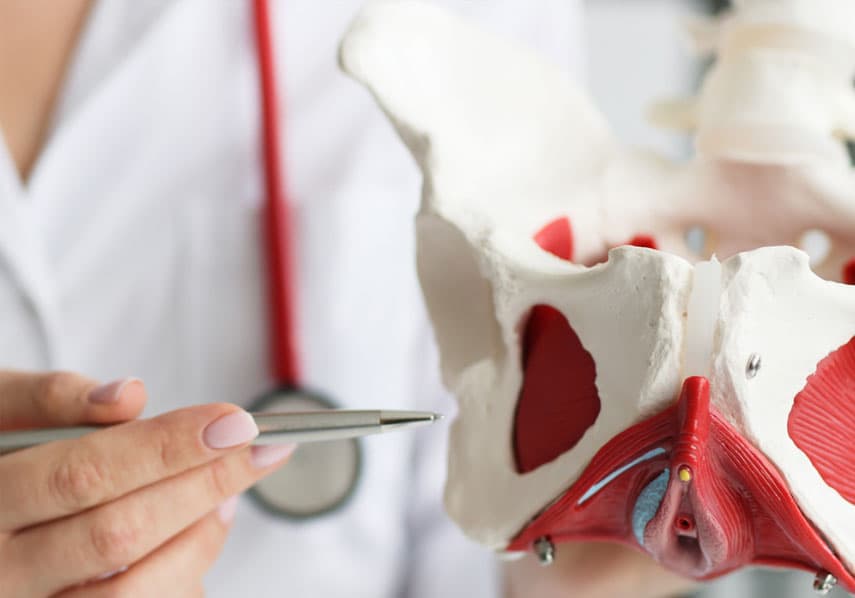What is Pelvic Congestion Syndrome?
Pelvic congestion syndrome (PCS) is characterised by persistent pain and discomfort in the pelvic and lower abdomen. The condition arises when blood pools in the pelvic veins, leading to discomfort and swelling. Chronic pelvic pain is described as intermittent or continuous discomfort, lasting for 3-6 months and persisting throughout the menstrual cycle, and is unrelated to pregnancy. It’s not uncommon for those suffering from chronic pelvic pain to become disabled to some degree, which calls for medical intervention.
Due to a general practitioner’s possible lack of familiarity with PCS, the condition is frequently undiagnosed. Not only is it generally undetected, but PCS is also one of the most commonly misdiagnosed pelvic venous disorders. It’s a common reason women of childbearing age suffer from persistent pelvic discomfort.
What Causes Pelvic Congestion Syndrome?
Several factors can contribute to the development of pelvic congestion syndrome, including:
- Hormonal changes: Hormonal changes, such as those that occur during pregnancy, can weaken the veins in the pelvis, leading to the formation of varicose veins.
- Multiple pregnancies: Women who have had multiple pregnancies are at an increased risk of developing PCS, as the increased blood flow and pressure on the veins in the pelvis can cause them to become enlarged and congested.
- Genetics: Some women may have a genetic predisposition to develop varicose veins, including in the pelvis, which can contribute to developing PCS.
- Chronic constipation: Chronic constipation can place additional pressure on the veins in the pelvis, leading to congestion and swelling.
- Previous pelvic surgery: Women who have had previous pelvic surgery, such as a hysterectomy or C-section, are at an increased risk of developing PCS due to the potential for damage to the veins in the pelvis.
- Menopause: Hormonal changes during menopause can lead to varicose veins developing in the pelvis, leading to PCS.
It is worth noting that these factors can increase the risk of developing PCS. Still, they do not guarantee that a woman will develop the condition. Additionally, some women may develop PCS without having any of these risk factors.
Who Does It Affect?
The majority of those who suffer from PCS are women. Although any woman can be affected by PCS, it is most common in those in their reproductive years, especially those in their 30s and 40s.
How Does One Recognize Pelvic Congestion Syndrome?
The following are some of the most common symptoms of pelvic congestion syndrome:
- Chronic pelvic pain: Women with PCS may experience a dull, aching pain in the lower abdomen, pelvis, lower back, or legs, especially after standing for long periods.
- Dysmenorrhea (painful periods): Women with PCS may experience severe pain and discomfort during their menstrual cycle.
- Increased abdominal size: Women with PCS may notice an increase in abdominal size due to swelling in the pelvic area.
- Varicose veins: Women with PCS may develop varicose veins in the legs or vulva, which can be seen or felt as bulging veins.
- Fatigue: Women with PCS may experience fatigue and a general feeling of sickness.
- Pain during sexual intercourse: Women with PCS may experience pain during sexual intercourse, as the enlarged pelvis veins can pressure the vaginal and cervical tissues.
- Bladder or bowel problems: Women with PCS may experience bladder or bowel problems, such as urinary incontinence or constipation, due to the pressure placed on these organs by the enlarged veins in the pelvis.
These symptoms can be similar to those of other conditions, such as endometriosis or fibroids. Therefore, it is always recommended to get further insights from a vascular specialist.
How is Pelvic Congestion Syndrome Treated?
Treatment for PCS will depend on the severity and specific symptoms of the condition. However, the following are some of the most common treatments for PCS:
- Medications: Over-the-counter pain relievers or nonsteroidal anti-inflammatory drugs (NSAIDs) can manage pain and discomfort.
- Hormonal therapy: Hormonal therapy, such as birth control pills, can help to regulate hormonal changes and reduce the risk of developing PCS.
- Compression stockings: Wearing compression stockings improves blood flow and reduces swelling in the legs, which can also help reduce symptoms of PCS.
- Physical therapy: Physical therapy, such as pelvic floor muscle exercises, can help to improve posture, reduce pain, and improve overall physical function.
- Minimally invasive procedures: Minimally invasive procedures, such as venous embolization or pelvic vein ligation, can treat PCS by blocking off the enlarged veins in the pelvis and improving blood flow.
- Surgery: In severe cases, surgery may be recommended to treat PCS, such as pelvic vein ligation or pelvic vein stripping, which can help to reduce symptoms and improve the overall quality of life.
It is important to note that the specific treatment plan for PCS will depend on individual factors, such as the severity and specific symptoms. Consult a vascular surgeon to determine the best course of action.









